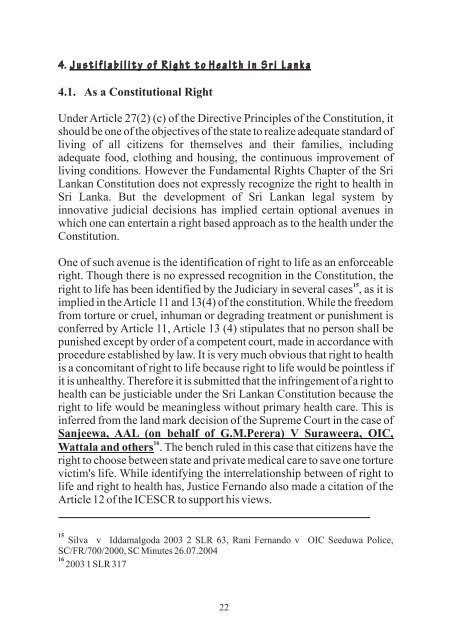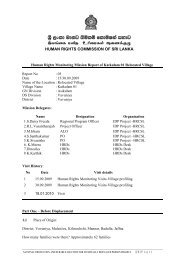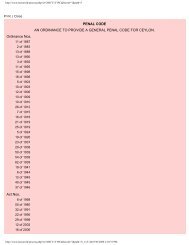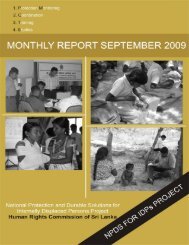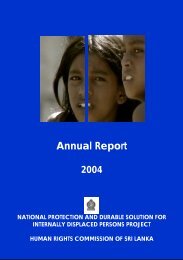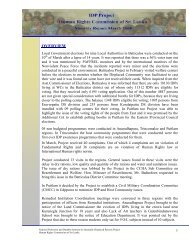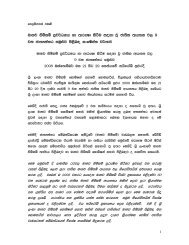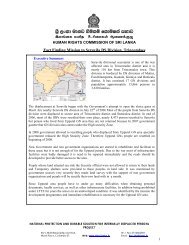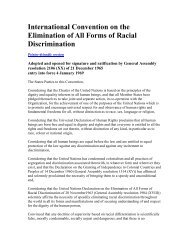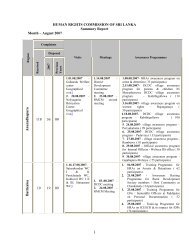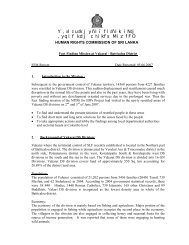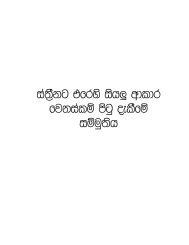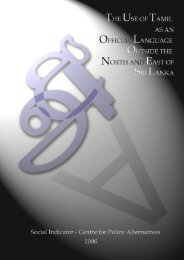Right to Health of Internally Displaced Persons - IDP SriLanka
Right to Health of Internally Displaced Persons - IDP SriLanka
Right to Health of Internally Displaced Persons - IDP SriLanka
Create successful ePaper yourself
Turn your PDF publications into a flip-book with our unique Google optimized e-Paper software.
4. Justifiability i i i t <strong>of</strong> <strong>Right</strong> <strong>to</strong> <strong>Health</strong> in Sri Lanka<br />
a<br />
4.1. As a Constitutional <strong>Right</strong><br />
Under Article 27(2) (c) <strong>of</strong> the Directive Principles <strong>of</strong> the Constitution, it<br />
should be one <strong>of</strong> the objectives <strong>of</strong> the state <strong>to</strong> realize adequate standard <strong>of</strong><br />
living <strong>of</strong> all citizens for themselves and their families, including<br />
adequate food, clothing and housing, the continuous improvement <strong>of</strong><br />
living conditions. However the Fundamental <strong>Right</strong>s Chapter <strong>of</strong> the Sri<br />
Lankan Constitution does not expressly recognize the right <strong>to</strong> health in<br />
Sri Lanka. But the development <strong>of</strong> Sri Lankan legal system by<br />
innovative judicial decisions has implied certain optional avenues in<br />
which one can entertain a right based approach as <strong>to</strong> the health under the<br />
Constitution.<br />
One <strong>of</strong> such avenue is the identification <strong>of</strong> right <strong>to</strong> life as an enforceable<br />
right. Though there is no expressed recognition in the Constitution, the<br />
15<br />
right <strong>to</strong> life has been identified by the Judiciary in several cases , as it is<br />
implied in theArticle 11 and 13(4) <strong>of</strong> the constitution. While the freedom<br />
from <strong>to</strong>rture or cruel, inhuman or degrading treatment or punishment is<br />
conferred by Article 11, Article 13 (4) stipulates that no person shall be<br />
punished except by order <strong>of</strong> a competent court, made in accordance with<br />
procedure established by law. It is very much obvious that right <strong>to</strong> health<br />
is a concomitant <strong>of</strong> right <strong>to</strong> life because right <strong>to</strong> life would be pointless if<br />
it is unhealthy. Therefore it is submitted that the infringement <strong>of</strong> a right <strong>to</strong><br />
health can be justiciable under the Sri Lankan Constitution because the<br />
right <strong>to</strong> life would be meaningless without primary health care. This is<br />
inferred from the land mark decision <strong>of</strong> the Supreme Court in the case <strong>of</strong><br />
Sanjeewa, AAL (on behalf <strong>of</strong> G.M.Perera) V Suraweera, OIC,<br />
16<br />
Wattala and others . The bench ruled in this case that citizens have the<br />
right <strong>to</strong> choose between state and private medical care <strong>to</strong> save one <strong>to</strong>rture<br />
victim's life. While identifying the interrelationship between <strong>of</strong> right <strong>to</strong><br />
life and right <strong>to</strong> health has, Justice Fernando also made a citation <strong>of</strong> the<br />
Article 12 <strong>of</strong> the ICESCR <strong>to</strong> support his views.<br />
15<br />
Silva v Iddamalgoda 2003 2 SLR 63, Rani Fernando v OIC Seeduwa Police,<br />
SC/FR/700/2000, SC Minutes 26.07.2004<br />
16<br />
2003 1 SLR 317<br />
22


